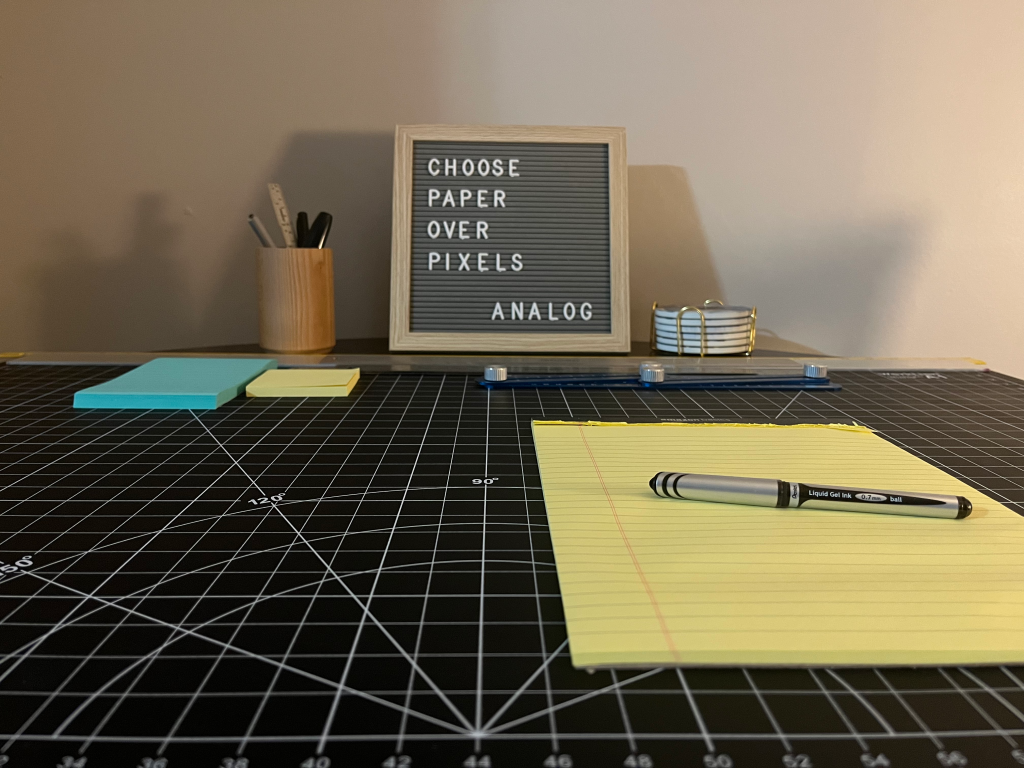Introduction: The Problem of the “Expert Googler”
For years, I had a habit. Faced with any problem—or any uncomfortable emotion—my first instinct was to research it into submission. This became a coping mechanism:. a way to ‘solve’ my emotions instead of feeling them. I was drowning in digital noise, so I created a simple rule for myself: Choose paper over pixels.
This pattern of “Googling” things spread to my personal life as well. Any time a family member had a computer problem, the first thing I’d do is google the problem. It was a habit formed over decades as a software developer.
I’m also a deep thinker. I have a need to know the fundamentals of how things operate, and I have a need to understand systems. Coupled with my “Googling”, I’ve spent so many hours getting lost in researching topics, it became overwhelming. But I wasn’t paying attention to my body, so I was prone to burnout. I also like to think of myself as evidence-based, so I wanted data-backed answers. I also learned in university to fact check resources, and find 3 independent sources coming to the same conclusions.
Boundary: Reclaiming your Mind
The “Choose Paper of Pixels” boundary evolved over time, starting with a constraint I placed on a homework assignment in therapy. My therapist emailed me 4 PDFs for my homework on Boundaries. My assignment was to complete the forms, and bring them back the next time.
I was talking a lot about boundaries and constraints in therapy. My therapist pointed out that I used the word boundary multiple times in the session. I talked about how I’m thinking about boundaries at work, about what my role requires me to do, and then thinking about things that I was doing and thinking about that were not strictly necessary and were causing me to feel overwhelmed. I started realizing there were things that were not part of my job, were outside of my control, and therefore there was no point for me to even think about those things. I was setting constraints on myself to make sure I could show up for the job that was most important, and be there for my team.
I had the idea that maybe there were constraints that I should place on myself in therapy. I wanted to stop being my own therapist in therapy. I wanted to stay in my emotions and let my therapist do the analysis. I wanted that same constraint during my homework. Since I know my natural habit of Googling things and I had a need to stay in my emotions, I thought it only logical that I should do my homework without use of internet based tools. So I suggested that I complete the homework using only pen and paper – no internet allowed. This forced me to process things in my own language using ideas I already had. Research muddies up my answers, and therapy is less effective as a result.
My therapist loved this idea, immediately seeing its power. She asked me if she could use this idea in her other therapy sessions with other clients. For her, it’s a way for her online clients to get the same experience that clients that visit her in her office would get, by having to fill out a paper form.
Anchor: Grounding in the Physical World
There’s a quiet authority in the feel of a quality pen gliding across thick paper. The slight resistance, the gentle scratch of pen on paper—these physical sensations anchor me in the present moment.
Writing with pen to paper forces me to slow down, since I write slower than I can type. Having a pen in my hand helps me regulate – I’m very fidgety, so writing with a pen calms me down and isn’t distracting to others.
There is something that happens when writing that I can’t adequately describe. The therapists out there might be able to explain why repetitive motions help regulate your nervous system. I know it works. It’s a similar effect that happens when I’m shovelling the driveway, or running the snowblower. The only thing to focus on is the snow remaining, and where I’m going to put it. Once I get into a rhythm, time passes calmly, and my mind is quiet.
Lens: A Tool for Deeper Focus
I was doing similar things at work while going to meetings before I had the idea to apply it to therapy. I would leave my laptop at my desk, and bring a notepad and a pen to the meetings. This freed me up from potential digital distractions, or temptation to zone out of the meetings by jumping into work tasks.
Without the digital distractions, I was free to observe the human interactions in the meeting, and hear what wasn’t said. I learned things that no one else was even paying attention to. I was just trying to stop myself from getting overloaded using a simple technique.
Pen and paper allowed me to process my thoughts and emotions, without having to rely on my external processing. I think out loud, which can be disruptive in meetings that aren’t brainstorming. By processing using pen and paper, I can apply a “filter” to my words. This allows me to form and articulate ideas without adding confusion to meetings white I talk out loud.
Conclusion: The “Authentic Nerd” Synthesis
“Choose Paper Over Pixels” isn’t a manifesto against technology, it’s about intentional usage. The Nerd side of me has a love for tangible, well-defined systems, while the Authentic side of me has a need for mindful, authentic living. “Choose Paper Over Pixels” is a practice that integrates both halves of my identity, The Authentic Nerd.
“Choose Paper Over Pixels” is so important to me, that I’ve made it a point to put it on my letter board. It’s my personal anchor in a chaotic world, proving that simple tools can be the most powerful ones we have.
